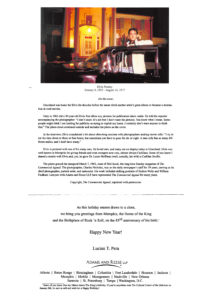Do you struggle with keeping realistic expectations? In this episode of the Maximum Lawyer Podcast, Tyson and Jim share their insights on unbridled optimism and how it relates to the field of law.
In this episode, Jim and Tyson interview Ryan Locke a criminal defense attorney in Atlanta. Actually, he runs his own law firm; the Ryan Locke Law Firm. They will go over his career, the things that drove him to be a lawyer, his past from the public sector to private, his struggles running his firm and marketing.
The Firm: https://thelockefirm.com/
Ryan’s podcast: https://thelockefirm.com
Ryan’s biggest piece of advice: CUSTOMER EXPERIENCE:
“when going solo, I thought about not having an office, but then I realized clients in criminal defense need to know that you’re legit and have that experience. That experience has to be good from beginning to end.”
Hacking’s Hack: Stand out! Check out this card:
Ryan’s Tip: An App. On Mac: Text Expander. On Windows: Phraseexpress. You type something and the it punches in more text than you type. Semi-automate documents!
https://textexpander.com/
Tyson’s Tip: https://www.process.st/
Process Street is a simple, free and powerful way to manage your team's recurring checklists and procedures.
Thanks so much for listening to the show! If you want to know more about this and keep on maximizing your firm, please join our Facebook group: https://www.facebook.com/groups/403473303374386/ or like us on Facebook: https://www.facebook.com/MaximumLawyerPodcast/ and comment!
You can also go to https://maximumlawyer.com/ or, if you’d prefer, email us at: [email protected]
Do you want to get on the show? Shoot us an email or message us!
The Maximum Lawyer Podcast. Partner up, and maximize your firm.
Guild Membership
Free Access to Stage 1 of Maximum Lawyer in Minimum Time
Sign Up Today!Customer Reviews
4.9 out of 5
Join Our Facebook Group
Enjoy Exclusive Access To Stage One Of The Maximum Lawyer In Minimum Time Course
Privacy Policy
This privacy policy has been compiled to better serve those who are concerned with how their ‘Personally Identifiable Information’ (PII) is being used online. PII, as described in US privacy law and information security, is information that can be used on its own or with other information to identify, contact, or locate a single person, or to identify an individual in context.
Please read our privacy policy carefully to get a clear understanding of how we collect, use, protect or otherwise handle your Personally Identifiable Information in accordance with our website.
What personal information do we collect from the people that visit our blog, website or app?
When ordering or registering on our site, as appropriate, you may be asked to enter your name, email address or other details to help you with your experience.
When do we collect information?
We collect information from you when you register on our site, place an order, subscribe to a newsletter, Use Live Chat, Open a Support Ticket or enter information on our site.
How do we use your information?
We may use the information we collect from you when you register, make a purchase, sign up for our newsletter, respond to a survey or marketing communication, surf the website, or use certain other site features in the following ways:
- To personalize your experience and to allow us to deliver the type of content and product offerings in which you are most interested.
- To improve our website in order to better serve you.
- To allow us to better service you in responding to your customer service requests.
- To quickly process your transactions.
- To send periodic emails regarding your order or other products and services.
- To follow up with them after correspondence (live chat, email or phone inquiries)







